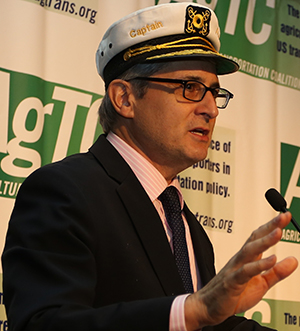The top regulator in maritime shipping vows to quickly implement ocean shipping reforms once they pass Congress, but some long-time veterans of shipping policy say the historically docile agency hasn't made use of the authority it already has, and they doubt it will act as aggressively as U.S. agriculture interests want.
 Daniel Maffei, Federal Maritime Commission Chairman
Daniel Maffei, Federal Maritime Commission ChairmanFederal Maritime Commission Chairman Daniel Maffei told Agri-Pulse the Ocean Shipping Reform Act is the key to unlocking new regulatory authority over the powerful carrier alliances responsible for moving the bulk of U.S. agriculture overseas.
Maffei said he will move quickly to implement the bill within the first six months. “Once given that authority, we will move on it," he said.
“We’re already doing a lot, but I do feel we’re at the limit" of the commission's authority. He said "a lot of the stuff that the carriers are doing, on the surface of it, anyway," doesn't violate existing law.
Separate versions of OSRA that have passed the House and Senate would give broad discretion to FMC to impose new regulations on ocean carriers. The legislation also would allow more short-term changes to policies on detention and demurrage fees that have plagued ag shippers whose goods have been left on the docks.
The Senate-passed bill is awaiting approval or additional changes in the House. The Senate approved its version by unanimous consent last month.
OSRA reserves a one-year process for most rulemaking provisions surrounding exports, including redefining what it means for a carrier to unreasonably decline a shipment. It also contains provisions for detention and demurrage, transparency and discrimination, most of which are required within 30 to 45 days after approval.
The House-passed version is more prescriptive in its language for the FMC, while the Senate version defers more decision-making to the agency. In either OSRA package, the FMC would be responsible for rewriting the rules of ocean shipping in ways that remain to be seen.
Critics say the agency has never challenged an ocean carrier under existing law, even though it has had the authority to crack down on carriers since the 1980s.
Maffei said the new legislation is “not a magic bullet,” but would give the agency “more to investigate.”
“That’s a big difference, [because] right now we can’t investigate much,” Maffei said. “We’re investigating what we can, but this would give us a broader field to investigate.”
Maffei said part of the reason for the commission’s lack of authority is that the laws around ocean shipping haven’t been rewritten since 1998 when the Shipping Act of 1984 was updated with the Ocean Shipping Reform Act of 1998.
The Shipping Act allowed carriers to strike agreements with shippers and marine terminals to “discuss, fix, or regulate rates or other conditions of service.” The agreements are generally exempt from antitrust provisions and must be submitted to the FMC, which has limited power to object or investigate. If unchallenged, the agreements automatically enter into force after 45 days. It also forbids third parties from challenging the agreements.
One lawyer with years of experience in maritime policy told Agri-Pulse, "it's a foregone conclusion [FMC] really has no power to block these agreements."
The carriers have since formed alliances, conglomerates of numerous carriers that consolidate maritime shipping further.
“Frankly I do not think any of this proposed legislation will have any effect. FMC largely does not enforce the existing law or keep the three carrier alliances inbounds under the terms of their filed agreements,” the lawyer said. "The FMC has a very limited legal staff and they don't have really a litigation staff — and the law says that FMC is the only party who can bring an action to block an agreement and secondly, no private party can intervene."
But another attorney who specializes in maritime shipping who spoke with Agri-Pulse on the condition of anonymity said OSRA would “shortcut” arguments over FMC’s lack of authority, giving them “plenty” of it.
There have been new entrants into the carrier industry which serve U.S.-bound imports exclusively, and the lawyer thinks the commission is focused on those carriers.
U.S. buyers have been purchasing so many goods since the COVID-19 pandemic began that certain shippers have begun a practice of leaving U.S. ports with empty containers, returning to Asia to refill with U.S.-bound imports, and coming back to the U.S. with them.
Maffei said OSRA would help incentivize exports, calling the export issue the primary reason the new legislation is necessary.
"Ag exporters are already at a certain disadvantage even in a regular market," Maffei said. "But the way the import boom has occurred due to demand in the U.S. and other Western countries has changed that equation and put ag exporters at even more of a disadvantage."
“Any of the versions of the bills would give us substantially more leverage to incentivize carriers to carry exports, in particularly ag exports, and that’s the whole point,” Maffei continued. “It would give the FMC additional leverage in terms of making sure a carrier is not rejecting export boxes in favor of empties for no good reason … it certainly changes the incentive calculus.”
But Peter Friedmann, the executive director of the Agriculture Transportation Coalition and an author of the 1984 Shipping Act, told Agri-Pulse that passing OSRA amounts to “hand-holding” the FMC to do what they’ve already had the authority to do.
 Peter Friedmann, Agriculture Transportation Coalition
Peter Friedmann, Agriculture Transportation Coalition“FMC over the decades has rather convinced itself it doesn’t have much authority,” Friedmann said. “What Congress is doing is essentially what the FMC has had the authority [to do] and should have been doing all along.”
Friedmann said the FMC has “had the authority since 1984 to review the carrier agreements that they have to file with the commission and challenge any of them … since 1984, the FMC has never challenged even one carrier agreement.”
Looking for the best, most comprehensive and balanced news source in agriculture? Our Agri-Pulse editors don't miss a beat! Sign up for a free month-long subscription.
“[OSRA] actually mandates certain actions. So, we believe that number one will make a huge difference in the commission not acting as it has in previous decades but acting in the way now Congress expects it to act to promptly implement the statutory mandates,” Friedmann said. “Those mandates are very clear now on the carriage of export cargo, on detention and demurrage, et cetera.”
Maffei said the explicit language is welcome, because “having the support of Congress … puts a lot more teeth into that and nobody can talk out a particular chairman … it’s a congressional mandate and Congress is listening.”
Detention and demurrage fees, which are assessed to shippers whose containers have either not been returned promptly or have lingered on the docks for too long, have become a thorn in the side of agricultural exporters dealing with port backups.
OSRA would require carriers and marine terminals to certify detention and demurrage charges. Carriers would also be subject to fees themselves should FMC find a charge has been deemed false or inaccurate, and FMC would be required to make publicly available any charges applied or deemed false.
The charges are agreed to in shipper contracts, and shippers typically have a grace period of between two and five days before they are charged. The charges are meant to speed up the process of loading and unloading and ensure terminal space isn’t used for storage. But the backups and delays at ports have revealed a flaw in the system where shippers are being charged detention and demurrage fees for circumstances out of their control, like a container not being available when the goods arrive at the terminal.
Friedmann said that provision is an integral part of the bill due to the effect detention and demurrage charges have had on ag shippers specifically.
According to a shipper survey from AgTC, 41% of all exported ag cargo is subject to detention and demurrage fees.
“It has had a devastating impact,” Friedmann said. “We want the carrier to certify that that container was available to be picked up and loaded and then returned to that terminal within that free time — and if it wasn’t they have to certify … but they cannot charge detention and demurrage unless the carrier certifies that they are in compliance with FMC’s rule.”
FMC in 2020 issued an interpretive rule on detention and demurrage. In a notice in the Federal Register, the agency said the rule was intended to reflect three principles.
First, FMC said, “importers, exporters, intermediaries, and truckers should not be penalized by demurrage and detention practices when circumstances are such that they cannot retrieve containers from, or return containers to, marine terminals because under those circumstances the charges cannot serve their incentive function.”
The agency continued that “importers should be notified when their cargo is actually available for retrieval,” and that “demurrage and detention policies should be accessible, clear, and, to the extent possible, use consistent terminology.”
Maffei said detention and demurrage will be looked at again in rulemaking, both its own and that spurred by OSRA.
“Both the legislation and our own efforts independent of the legislation are to more clearly define some of the rules behind the detention and demurrage rule, for instance, billing,” Maffei said. “Far more bills are going out than are actually legitimate charges and when the billee on one of these charges does challenge it, often the carrier says, ‘Oh you’re right’ and removes it.' But that puts the onus on the person charged with the detention and demurrage. So that doesn’t seem fair to us.”
Cary Davis, the vice president of government relations and general counsel of the American Association of Port Authorities, said reasonable detention and demurrage policies are essential to ports.
“The ports want to continue within reason and with transparency to have the power to use incentives — behavioral incentives, economic incentives, financial incentives — to ensure cargo owners aren’t exploiting dock tarmac as free warehousing space,” Davis said.
He added that AAPA's lobbying on the bill has been "successful in getting us to a place that would not handicap the ability of ports and terminals to use financial incentives to clear cargo off the baggage carousel.”
Maffei agreed with critics that the commission has staffing issues. The agency "lack[s] the people to follow up on every good lead we have" and could use more resources, he said. But he insisted he and the commission are doing what they can to get ag exports overseas and that OSRA would help.
"Ag exports are the thing that's clearly been an issue ... and the most frustrating thing is the fact that there are real demand and increased demand in large parts of Asia for many if not most of our agricultural exports," Maffei said. "We're doing everything we can given our current authority ... for me it's one of the top priorities, and I'm supportive of the legislation for that reason."
For more news, go to www.Agri-Pulse.com.


